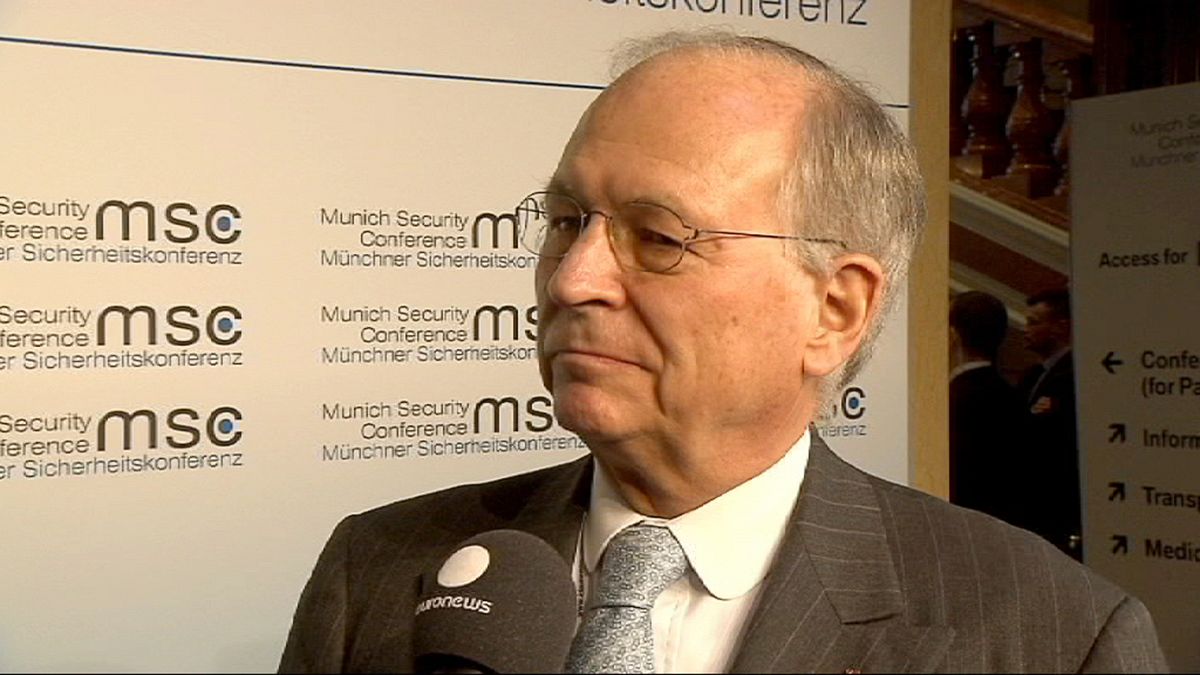With unrelenting deadly news from Eastern Ukraine, international diplomacy is having difficulty gaining traction.
We talked to Wolfgang Ischinger, German former special envoy to Ukraine for the Organisation for Security and Development in Europe, and then to Russian Deputy Defence Minister Anatoly Antonov, for their insight. The Antonov transcript will follow the first interview, here.
Ischinger chaired the Munich Security Conference (7-9 Feb. 2015).
Wolfgang Ischinger, former OSCE special envoy to Ukraine:
“If the diplomatic effort fails and if we do see a need to raise the level of pressure, I think all available options should be considered carefully, and I don’t think it’s a very good idea to throw any option in the waste basket before even having taken a look at it. There are obviously enormous risks if you start delivering weapons; there’s’ a risk of escalation. On the other hand, if you do nothing you risk further cutting a country in two and abandoning the very principles on which European security has been built.”
James Franey, euronews:
“Have there been any examples when economic sanctions have changed the foreign policy of a major power such as Russia?”
Ischinger:
“Sanctions are really a terribly bad instrument of diplomacy, no doubt about it. They don’t work very well. If they work, there’s always a side effect of a movement to help the leader, defend the country, because the country has been ‘attacked’ from the outside. So, quite obviously sanctions are not a great idea. What else can we do? Sanctions, not a great instrument, was the only option forward. It’s one of these classic situations of diplomacy where you have a few options and none of them looks very good, so you have to choose the one that is the least bad.”
euronews:
“Is Putin trying to divide the West?”
Ischinger:
“It would be very strange if he did not try to benefit from differences between and among the Western allies, of course. We have imposed sanctions. From a Russian point of view, this is not only an unfriendly act, this is a terribly unfriendly act and if I were a Russian advisor I would say ‘let’s do our best to divide these people so that they cannot extend the sanctions regime into yet another period’. That is obviously the Russian interest. It has to be.”
Russia’s Antonov would be ‘honoured’ to feature on EU blacklist
Russian Deputy Defence Minister Anatoly Antonov is expected to be sanctioned by the EU.
New names added to the bloc’s blacklist is set to be published next week.
The Reuters news agency reported on February 6 that Antonov was amongst them.
The move would focus on travel bans and asset freezes.
The 59-year-old said that he would be “honoured” to feature on the EU’s sanctions list.
“I am honoured because it means that I am working effectively. It is a positive remark and it is a high evaluation or estimation of what I has (sic) made,” he told euronews on the sidelines of the Munich Security Conference.
“I am a little surprised when I hear that somebody would like to introduce sanctions against diplomats. What will be in the future? Who will start dialogue?”
“If somebody think (sic) I will stop talking about the necessity of dialogue. The necessity to find a solution on various issues, it is a mistake. I did, I do and I will protect and defend foreign policy of Russian Federation and policy of my president.”
Antonov also denied Western claims that Russia supplies arms to separatists in Ukraine.
euronews:
Many people here at the Munich Security Conference, at least on the sidelines, have said that Russia hasn’t shown a great deal of willingness to have dialogue if you look at the Minsk agreement, people here argue that you are not implementing it.
Russian Deputy Defence Minister Anatoly Antonov:
Don’t forget please that Russia is not a member of the conflict. Not a part of the conflict and we are not participating..
euronews:
People would challenge that as well, though.
Antonov:
There are a lot of rumours about the situation in this region.
euronews:
When you say you are not part of this conflict, if you are not admitting or you are not saying that you are part of this conflict. Why does Russia need to be involved (in talks)?
Antonov:
All solutions we can see through dialogue through Kiev and the self-defensive forces of Lugansk and Donetsk. As to Russia….
euronews:
That’s what you call the separatists?
Antonov:
No, we don’t want to call them separatists. They are people who want their rights to be respected. They don’t want to say that we would only to speak using one language, but if somebody in Kiev would like to prohibit to use, for example, Russian…they would like to speak their native language.
euronews:
The Ukrainian constitution protects that right.
Antonov:
There were some ideas to introduce some restrictions.
euronews:
But it was never implemented.
Antonov:
Yes, yes. And, of course, I support such a decision. We just have to help them (Kiev and separatists) reach an agreement.
euronews:
You mentioned, obviously, the Russian line that you are not arming the separatists in any way whatsoever. Where are they getting their weapons from then?
Antonov:
There will be a lot of depots of arms and ammunitions on the territory of all republics of the former Soviet Union, including Ukraine. The ‘self-defensive’ forces are using these arms and ammunition. They take a lot of arms and ammunition from the army.
